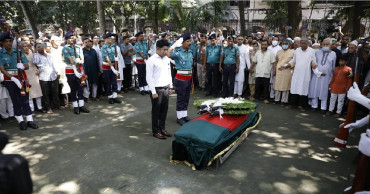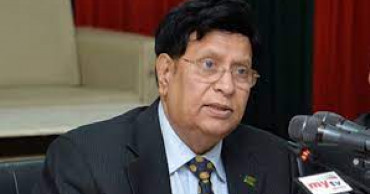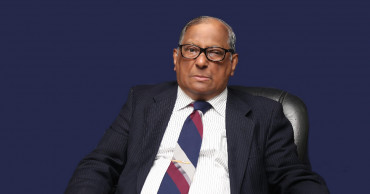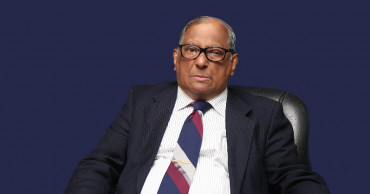Economist
Akbar Ali Khan laid to rest
Former advisor to the caretaker government and economist Dr Akbar Ali Khan was laid to rest at the city's Martyred Intellectual graveyard in Mirpur this afternoon (September 9, 2022).
His Namaz-e-janaza was held at Azad Mosque in Gulshan after Jumma prayer. After the Janaza, he was given a guard of honor by the district administration in the mosque premises.
Planning Minister MA Mannan, Cabinet Secretary Khandkar Anwarul Islam, Gonoshasthaya Kendra (GK) Founder and Trustee Dr Zafrullah Chowdhury and former NBR Chairman Badiur Rahman took part in his janaza among others.
Earlier in the day, the body of Akbar Ali Khan was taken to his residence in Gulshan where his relatives, prominent personalities and cross section of people paid their last respect.
Akbar Ali passed away in Dhaka last night following a prolonged illness. He was 78.
Foreign Minister AK Abdul Momen, Dhaka University Vice-Chancellor Prof Dr Md Akhtaruzzaman and different organisations including Transparency International Bangladesh (TIB) and Bangladesh Economic Association expressed shock and deep sorrow at his death.
Read: Dr. Akbar Ali Khan: A farewell to the Professor of integrity
3 years ago
Momen mourns Akbar Ali Khan's death
Foreign Minister Dr AK Abdul Momen has expressed shock and deep sorrow at the death of former adviser to the caretaker government and prominent economist Dr Akbar Ali Khan.
Akbar Ali passed away in Dhaka Thursday night after a prolonged illness. He was 78.
Momen prayed for the eternal peace of the departed soul and extended his heartfelt sympathy to Akbar Ali's family.
Also read: Dr. Akbar Ali Khan: A farewell to the Professor of integrity
3 years ago
Dr. Akbar Ali Khan: A farewell to the Professor of integrity
Like several others Dr. Akbar Ali Khan was to me a citizen of the 1971 liberation war. My first conversation with him was in 1978 when he was in government service and I was working for the 1971 History project. He was posted in the Ministry of Defence of the Mujibnagar government and it was about what the role of the government was. He had no illusions about it.
“We did our best as a national government without much power in an international power where the rest were all powerful.” Few could have summed up this aspect of the Muibnagar government so well as this. In some ways, he summed up the reality of the 1971 war in total.
I had always wondered how a professional intellectual of his caliber could survive and flourish as a civil servant. He topped the merit list in the Dhaka University History department and also entered the coveted CSP cluster. Yet he seemed much more at home in academia. He served his full quota of days and only then retired to return full time to the academia as a Professor at BRAC University.
Books, lectures and observations
Soon after independence, he taught at the Jahangiranagar University, did his ph.d , published his splendid thesis for which he was awarded the Asiatic Society medal and other notable work. It’s a major achievement of his that he never let his salaried jobs and other travails of his work life interfere with his own intellectual life. He just went beyond the ordinary demands of bureaucracy and held on more firmly to what mattered most to him- his intellectual life.
It was nothing if not wide ranging. His most celebrated work is his book on the history of villages and its depth of analysis is stunning. Few can dare to travel in that area of work without reading the book. His economic analysis books are very well known, well thought of and often quoted. But his most quirky book is the one which was devoted to -of all things- chase the identity of the ethereal lady of Jibananada Das’s poem, Banlata Sen , a figure that haunts many Bengali minds. It was almost a declaration of his shushil identity. His exploration was methodical and thorough no matter whether one agrees with his conclusions or not.
Safely far from politics
Mujibnagar amlas tend to be political party oriented like the two of my senior friends. H. T. Imam and Dr. Kamal Siddique, both belonging to opposite political poles. Unlike them, he had no party identity and was more concerned with governance than partisan politics. His remark that civil servants owe it to be driven by conscience not ideology was perhaps already too old fashioned in the amla world he left behind to join academia after his stint at the highest level of bureaucracy.
He had once told me in a conversation that what a civil servant misses most is his right to disagree. Few disagreed with him but I understand that he was wise enough to know its limitations. He was thoroughly unimpressed by his success as an amla.
My last conversation seemed like his own summation of governance in Bangladesh. “ The government’s first role is to punish the wicked and protect the vulnerable. “ No other tests are necessary, he added. He had made his own integrity a brand. One speaks with respect and reverence whenever his name comes up. That is the true mark of a life brilliantly governed. Farewell Professor Khan.
Also read: Momen mourns Akbar Ali Khan's death
3 years ago
Akbar Ali Khan no more
Former advisor to the caretaker government and economist Dr Akbar Ali Khan passed away in Dhaka Thursday night after a prolonged illness. He was 78.
Akbar Ali Khan was born in 1944 at Nabinagar in the Brahmanbaria district. He studied history at Dhaka University and secured first place in first class in both BA and MA exams. He studied economics at Queen's University Canada and obtained MA and PhD in economics.
He joined the Civil Service of Pakistan (CSP) in 1967. He actively participated in the Liberation War and was sentenced to 14 years' imprisonment in absentia by a military court of the occupation forces. He joined the provisional government of Bangladesh as deputy secretary, Ministry of Defense.
Akbar Ali taught development economics and development administration for three years at the Bangladesh Public Administration Training Center as a member directing staff. He taught postgraduate courses in governance and development studies departments at Brac University after his retirement.
He served with distinction in various ministries. He worked at the Ministry of Finance for more than 16 years at levels of joint secretary and above. He was chairman of the NBR and secretary of the Internal Resource Division for nearly three years.
Akbar Ali served as finance secretary for more than five and half years covering three consecutive governments. He was appointed the cabinet secretary in 2001 and retired from that position in 2002.
He was an advisor in charge of the ministries of finance, planning, commerce, post, telegraph and telephones in the caretaker government in 2006 and resigned in protest against the failure of the chief advisor in ensuring a free, fair and impartial election. He also served as the first chairman of the Regulatory Reforms Commission during 2007-2009.
As Finance Secretary, he played a prominent role in establishing Grihayana Tahbil (Fund for Housing of the Poor) and Karmasangsthana (Employment Generation) Bank. He was the chairman of the Social Development Foundation for two years.
Dr Khan served as minister (economic) at Bangladesh Embassy in Washington DC for four years from 1987-1991. He was the alternative executive director of the World Bank for more than three years, as the representative of the governments of Bangladesh, Bhutan, Sri Lanka and India.
He was elected chairman of the 42-nation FAO sub-committee on Surplus Disposal (Food Aid) for the year 1989. He was elected Vice Chairman of the Officials Committee of the UNCTAD Trade Summit in Columbus, Ohio in 1995.
He has published 14 books and several articles on economics, history, public administration, literature and water resources in various national and international journals. His first book "Some Aspects of Peasant Behavior in Bengal" was praised by The Journal of Economic History (USA) as "a significant contribution to the growing body of new economic history in South Asia."
Dr Khan's book "Discovery of Bangladesh" was rated by the Asiatic Society of Bangladesh as the best publication in humanities for the period 1996-98 and was awarded the Justice Md Ibrahim gold medal. His book "Parathaparatar Arthaniti" was highly commended for its wit and originality by Desh – the most widely circulated literary magazine of Kolkata.
His book "People's Participation in Budgetary Process in Bangladesh: In Search of Policy Reforms" was published in 2008 by Shamunnay – a national advocacy NGO. His latest publications include "Abak Bangladesh Bichitra Chhalanajale Rajneeti" (2017), "Gresham's Law Syndrome and Beyond" (2015,) "Ajab and Jabor Ajab Authraneeti" (2013), "Andhakarer Utsa Hote" (2011), "Friendly Fires, Humpty Dumpty Disorder and other Essays" (2010).
Akbar Ali was a member of the American Economic Association and a life member of the Asiatic Society of Bangladesh. He was awarded the Maulana Akram Khan gold medal for distinguished public service and the Mercantile Bank gold medal for economics research.
He was elected fellow of Bangla Academy in 2010 in recognition of his contribution to the economics and history of Bangladesh.
Also read: Momen mourns Akbar Ali Khan's death
3 years ago
Economic mismanagement creating instability in market: Debapriya
Noted economist Dr. Debapriya Bhattacharya said that the recent abnormal hike in fuel prices and then cutting it by only Tk. 5/litre is a classic example of economic mismanagement.
He said that the sudden increase of fuel price by Tk 44/litre at midnight, and then reduce it by Tk5/litre, is a fraud. Such decisions are being made due to lack of expertise, he added.
Debapriya, distinguished fellow of think tank Centre for Policy Dialogue (CPD) was speaking at the 'ERF Dialogue' organized by Economic Reporters Forum (ERF) on Tuesday.
He said Bangladesh's main problem is not in the foreign transactions, rather it is the weakness of the domestic financial sector.
He said the global recession may extend up to 2024, and its adverse impact can be reduced by strengthening the domestic economy.
He also identified four deviations in the domestic economy, which may create a turmoil in Bangladesh.
Read: Economy needs transitional policy to overcome the crisis: Debapriya
These deviations are: not getting adequate investment in the private sector, weakness in revenue generation, lack of necessary investment in education and health sectors, and discrimination in the social safety net programmes.
He said the growth is now being propelled by public investment as the private investment ratio to GDP has not increased over the years and still hovering around 23 to 24 per cent of GDP. On the other hand, the ratio of public investment to GDP has been increased to 7 to 8 per cent from 5 to 6 per cent.
“There has been no such foreign direct investment as the FDI is still below the one per cent of GDP which is not enough for a dynamic economy,” he said.
Referring to the attaining of GDP growth at 5 to 7 per cent on average over the last 10 years, the eminent economist said this suggests that the income is growing. “Then why the desired revenues are not being collected…is there any mismatch in the calculation?’
He opined that due to the comparatively lower level of revenue collection, the government has not been able to import food grains, side by side it has also not been possible to increase the coverage of the food assistance.
“The government is being unable to reduce the duty and tariff for which it has rely heavily on the indirect tax to collect revenues which has put the commoners under pressure,” he added.
Debapriya alleged that that the health and education sectors are not enjoying the desired level of investment although hefty investments are being made in the physical infrastructure sector.
He said the 20 mega projects are enjoying around 2 per cent investment of GDP whereas the investment in the health and education sectors is one percent each of GDP.
He noted that the political force has been trying to make visible physical infrastructural development in a speedy manner in a bid to fulfill the political deficit.
He alleged that there has been large-scale discrimination in the distribution of social safety net allowances during the COVID-19 pandemic as it was then proved that access to government services was not easy for the weak people.
Citing that competitive business environment is not being created in the country, he said that certain individuals or quarters are getting preferences from the policy makers for which there has been inadequate flourish of talent-based and international standard human resource development.
ERF président Sharmeen Rinvy presided over the programme, moderated by ERF general secretary SM Rashidul Islam.
3 years ago
Muhith: A gifted economist who was a prolific writer!
Former finance minister AMA Muhith was not only a gifted economist but also a prolific writer.
Bangladesh, Emerge of a Nation (1978), American Response to Bangladesh (1996), An Agenda for Good Governance (2007), History of Bangladesh: A Subcontinental Civilisation (2016), Bangladesh in the Twenty-First Century: Towards an Industrial Society (1999) and Smritir Monikothay (2014) are some of his popular books.
Five of his books were published by University Press Limited (UPL), one of the leading publishing houses in Bangladesh.
READ: First namaz-e-janaza of Muhith held
Mahrukh Mohiuddin, the owner of UPL, said Muhith was always interested in research work. "In spite of his busy schedule, he was actively engaged in research work. If the editor had any suggestions on any of his manuscripts, Muhith would welcome them."
"My father, Mohiuddin Ahmed, who published his books, told me that he had at times rejected Muhith's manuscript but he was never offended. That was his spirit," said Mahrukh.
3 years ago
Speakers praise economist Dr. Atiur Rahman for his pro-people work
Desh Proshongo, a Bengali magazine, has published a special issue on noted economist and Bangladesh Bank’s former governor Dr Atiur Rahman.
Speakers at the unveiling ceremony of the magazine here on Monday admired Dr. Atiur, who they said devoted his thoughts, writings and works for the impoverished people of the country.
Read:BB fixes loans at Tk 25,000 to Tk1.0 crore for CMSE under CGS
They said that Dr. Atiur focused on the poor and disadvantaged strata of the society during his tenure as Bangladesh Bank governor.
The function was held at the Khondkar Ibrahim Khaled Memorial Seminar Hall of Unnayan Shamannnay in the city.
Journalist Abed Khan was present here as the chief guest while Prof. Dr Ratan Siddiui and former Bangladesh Bank executive director Mahfuzur Rahman and Bank Asia Ltd. Managing Director Arfan Ali were present as special guests.
Freedom fighter- Dr. M. Amzad Hossain, Atish Dipankar Research Council President Golam Quader, Bangali Prokashoni Publisher Poet Arif Nazrul, Daily Manobkontho feature editor Achintya Chayan and Bangladesh Awami League’s cultural affairs sub-committee member- Sujatol Alom Kallol, Unnayan Shamannay emeritus fellow Khandakar Shakhawat Ali and Desh Proshongo Editor Imdadul Hoque Soofi also spoke in the function.
Read: BB fixes 15pc installment for CMSME to avoid loans classifying
Dr Atiur thanked everyone and said, the goal of all his intellectual endeavours is to motivate the youth to learn more about the two greatest Bengalis of all time- Bangabandhu Sheikh Mujibur Rahman and Rabindranath Tagore.
4 years ago
Dr John Clemens clarifies his position over Economist report
Responding to the much-discussed report run by The Economist over the number of infection cases in the capital city, Dr John D Clemens, who was mentioned on the report as reference, has clarified his position saying his statement was taken out of context.
5 years ago







.jpg)



